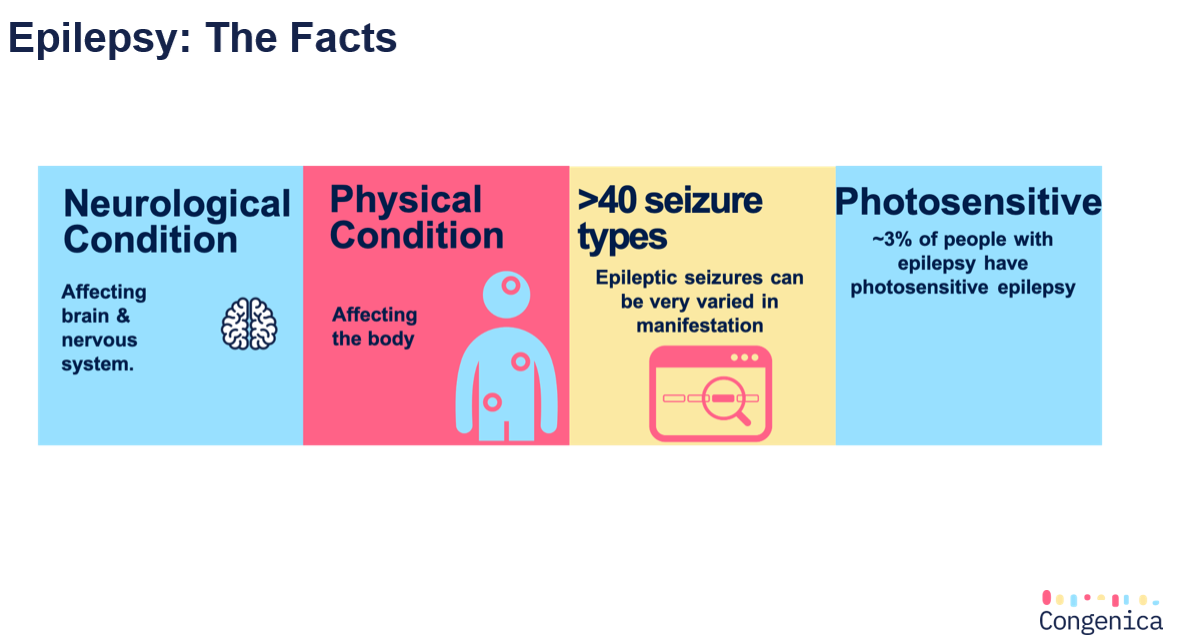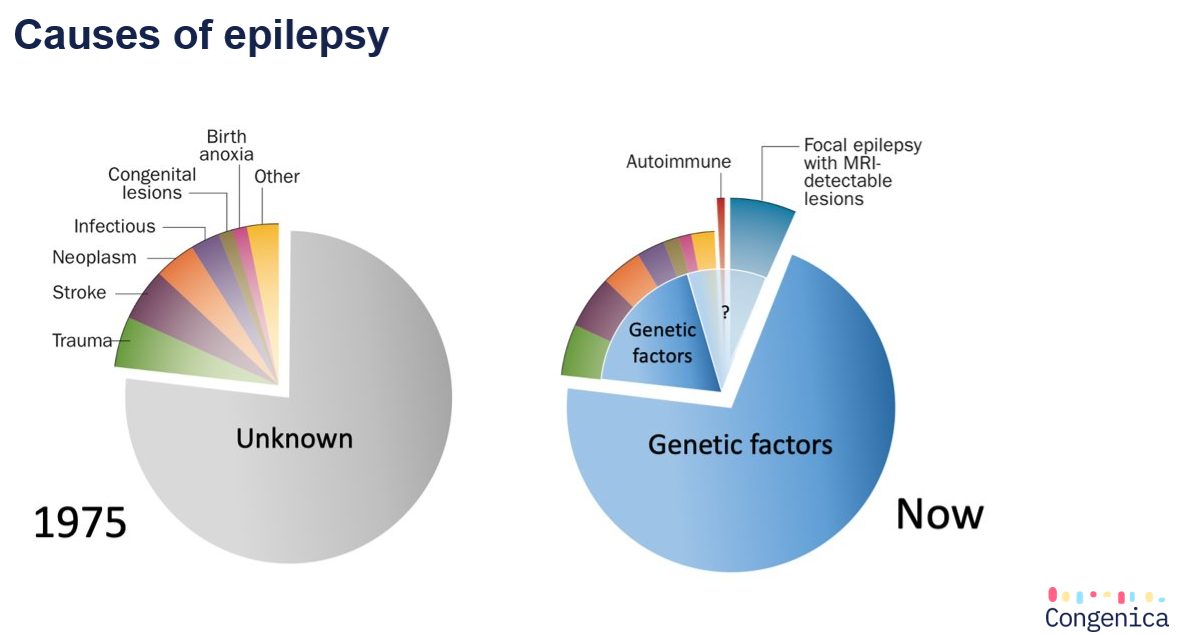'Global Barriers to The Adoption of Genomic Medicine' is a new initiative from Congenica's Patient Advocacy and Engagement (PAE) team, which reveals the global barriers to the adoption of genomics into everyday healthcare.
What are the barriers?
Financial limitations are clearly a major consideration around the globe. There is also a shortage of infrastructure, skills and training needed to help all patients benefit from genomics.
However, there are also many cultural perspectives around the world that can impact an individual’s ability to put themselves forward for screening.
As part of our Patient Advocacy and Engagement (PAE) work, we explore these and other barriers as well as the fundamental role of education and advocacy to help to connect people around the world who face similar challenges.
Global Barriers to The Adoption of Genomic Medicine, part 1: Malaysian Epilepsy Conference
This is the first in a series of posts that look at some of the barriers to genomics around the world. For the first article, we travel to Malaysia, where our PAE lead, Dr Charles Steward, and Chair of the PAE Advisory Board, Alistair Kent, worked closely with colleagues from Monash University and the Malaysian Epilepsy Society to plan and deliver a half-day webinar, ‘Epilepsy Advocacy: Challenges and Opportunities’. This blog covers the webinar in detail.
Malaysian Epilepsy Conference
Epilepsy Advocacy: Challenges and Opportunities
Dr Tan Meng Yoe, Associate Professor Mohd Farooq Shaikh, Dr Aiedah Khalek
Global Asia in the 21st Century (GA21), Monash University Malaysia
.png?width=753&name=Society%20and%20Culture%20Engaging%20Epilepsy%20Through%20Religion%20(1).png)
A public webinar entitled “Epilepsy Advocacy: Challenges and Opportunities” was held on the 28th of September, 2021. The event was jointly organized by Congenica, Monash University Malaysia, and the Malaysian Epilepsy Society. This webinar’s main goal was to engage the public to raise the level of awareness about epilepsy across a range of different contexts. Epilepsy is, of course, a complex disorder, and the complexity resides not only in the medical condition itself, but also within the socio-cultural perspectives that affect those living with epilepsy. A deeper understanding of medical research and ongoing support for patient advocacy are mutually essential, and indeed crucial in the overall effort to improve the situation for those living with epilepsy.
Patient Advocacy: Hearing from the Patient
The webinar featured a range of topics related to patient advocacy. The first session, Patient Advocacy: Hearing from the Patient, featured Ms Frisha Hossain. It was important for that the audience heard from a person living with epilepsy first during the webinar, and Ms Frisha set the tone for the rest of the evening when she described her “epilepsy ecosystem” as comprising the patient, doctor, and a strong social support system. Ms Frisha shared her journey of living with epilepsy since she was a child, detailing her struggles growing up, and her family’s support through the years, and her ability to adapt and excel in her career because of these strong support networks.

Society and Culture: Engaging Epilepsy Through Religion
The second session, Society and Culture: Engaging Epilepsy Through Religion, was a presentation that explores the possibility of engaging religious institutions in Malaysia to raise awareness about the disease among religious communities. The session featured research findings by the Monash research team of Dr Aiedah Binti Khalek, Dr Mohd Farooq Shaikh, and Dr Tan Meng Yoe, who conducted preliminary research on the level of knowledge of epilepsy among religious communities in Malaysia; the level of trust toward religious leaders and medical practitioners for medical information and education. The premise is that because a significant percentage of people trusted religious leaders on medical issues, it is possible that raising awareness through them would be a more effective method of engagement.
Science: Genomics and Epilepsy
The focus of the seminar shifted toward the medical sciences with Dr Charles Steward’s presentation on Science: Genomics and Epilepsy. Dr Steward, genome scientist and patient advocacy and engagement lead at Congenica, shared with the audience recent advances in DNA sequencing and how it is offering unprecedented opportunities to understand how our genomes can be responsible for susceptibility to disease as well as our response, both good and bad, to drugs. Using his family’s experience with epilepsy and genomics, Dr Steward explored how genomics is helping to give people with epilepsy an accurate genetic diagnosis that can also inform on best treatments that are guided by their genomic makeup.

Above graphs derived from Thomas and Berkovic Nature Reviews (2014)
Health Information: Managing Epilepsy
The final session was on the subject of Health Information: Managing Epilepsy, presented by Professor Dr Raymond Azman Ali, a practicing senior consultant neurologist and chairman of Epilepsy Council Malaysia. Professor Raymond’s session provided participants with information on the nature of epilepsy, the different types of epilepsy, how to identify symptoms associated with it, current treatment options, and several pointers on managing the disease in everyday life. The presentation was delivered in a manner that was easily accessible to the non-expert.
Patient advocacy for epilepsy patients
As part of the team that organized the webinar, an important lesson that we take away from this experience is that patient advocacy is, among other things, an ongoing series of conversations. It is through these conversations across different fields of research and study, and different segments of the community that we learn more about an issue, and make a positive impact in our respective communities. This is reflected in our respective journeys as researchers as well. Some of us work in different areas of research, such as religion, media, or communications, but through a series of conversations with colleagues from other faculties in Monash University Malaysia and later on with the team in Congenica, we are now actively collaborating and am on the journey of learning more intentionally about patient advocacy among epilepsy patients. It is our hope that this webinar has played a part in developing international collaborations on community engagement, patient advocacy, and knowledge transfer in the area of epilepsy advocacy.
The organizing team would like to register my thanks to Professor Stephanie Hemelryk Donald, head of School of Arts and Social Sciences at Monash University Malaysia, Mr Alastair Kent OBE, Chair of the patient advocacy and engagement advisory board at Congenica, and Dr Sherrini Bazir Ahmad, president of the Malaysian Epilepsy Society, for their support in the organizing of the webinar and delivering the opening remarks at the webinar.
To keep up to date with Patient Advocacy and Engagement (PAE) at Congenica, sign up to our newsletter today.
This blog is now repeated in Malaysian below.
Advokasi Epilepsi: Cabaran dan Peluang
Dr. Tan Meng Yoe, Profesor Madya Dr. Mohd Farooq Shaikh, Dr. Aiedah KhalekGlobal Asia in the 21st Century (GA21), Monash University Malaysia
Webinar awam bertajuk "Advokasi Epilepsi: Cabaran dan Peluang" telah diadakan pada 28 September 2021. Webinar ini dianjurkan bersama Congenica, Monash University Malaysia dan Persatuan Epilepsi Malaysia. Matlamat utama webinar ini adalah meningkatkan tahap kesedaran tentang epilepsi dalam kalangan masyarakat. Epilepsi merupakan gangguan kesihatan yang kompleks dan rumit, bukan sahaja disebabkan oleh keadaan perubatan malah faktor sosio-budaya yang memberi kesan kepada mereka yang mengidap epilepsi. Pemahaman yang lebih mendalam tentang penyelidikan perubatan dan sokongan berterusan untuk advokasi pesakit adalah sangat penting dalam usaha meningkatkan kondisi mereka yang mengidap epilepsi.
Oleh itu, webinar ini membawa pelbagai topik yang berkaitan dengan advokasi pesakit. Sesi pertama merupakan sesi advokasi pesakit yang merupakan perkongsian daripada seorang pesakit epilepsi, Cik Frisha Hossain. Sesi ini penting kerana penonton mendengar perkongsian pengalaman seseorang yang menghidap epilepsi. Cik Frisha menekankan tentang kepentingan "ekosistem epilepsi" yang melibatkan pesakit, doktor dan sokongan sosial yang kuat. Cik Frisha berkongsi perjalanan hidupnya sebagai pesakit epilepsi sejak kecil dengan menceritakan kisah perjuangan beliau, sokongan keluarga dan keupayaan beliau untuk menyesuaikan diri sehingga mampu berjaya dalam kerjaya.
Sesi kedua merupakan sesi 'Masyarakat dan Budaya: Pendekatan Melalui Agama'. Sesi ini membentangkan tentang penglibatan institusi agama di Malaysia untuk meningkatkan kesedaran tentang penyakit epilepsi dalam kalangan masyarakat beragama. Sesi ini memaparkan penemuan hasil penyelidikan oleh kumpulan penyelidik Monash University Malaysia iaitu Dr. Aiedah binti Khalek, Dr. Mohd Farooq Shaikh, dan Dr. Tan Meng Yoe. Para penyelidik menjalankan penyelidikan awal mengenai tahap pengetahuan epilepsi dalam kalangan masyarakat beragama, tahap kepercayaan terhadap pemimpin agama dan pengamal perubatan berkenaan maklumat dan panduan perubatan. Memandangkan terdapat peratusan tinggi orang yang mempercayai pemimpin agama dalam isu perubatan, penyelidik mengusulkan penglibatan institusi agama bagi meningkatkan kesedaran mengenai epilepsi dan menghapuskan stigma masyarakat terhadap pesakit epilepsi.
Seterusnya, tumpuan seminar beralih ke arah sains perubatan dengan pembentangan Dr. Charles Steward mengenai 'Sains: Genomik dan Epilepsi'. Dr. Steward, seorang saintis genom dan ketua advokasi dan penglibatan pesakit di Congenica berkongsi dengan peserta tentang penemuan terkini dalam penjujukan DNA dan bagaimana ia membuka peluang untuk memahami bagaimana genom manusia mempengaruhi kerentanan dan tindak balas kita terhadap penyakit dan ubat ubatan. Berdasarkan pengalaman keluarganya dalam epilepsi dan genomik, Dr. Steward meneroka bagaimana genomik membantu memberikan diagnosis yang tepat bagi pesakit epilepsi danmengetahui rawatan terbaik berdasarkan faktor genom mereka.
Sesi terakhir adalah mengenai 'Maklumat Kesihatan: Pengurusan Epilepsi', yang disampaikan oleh Profesor Dr. Raymond Azman Ali, Pakar Perunding Kanan Neurologi dan Pengerusi Majlis Epilepsi Malaysia. Profesor Raymond berkongsi dengan peserta mengenai ciri-ciri epilepsi, jenis-jenis epilepsi, cara mengenalpasti simptom, pilihan rawatan semasa, dan beberapa panduan menguruskan penyakit dalam kehidupan seharian. Pembentangan beliau disampaikan dengan cara yang mudah difahami oleh orang awam.Sebagai pihak penganjur, kami menyedari kepentingan advokasi pesakit sebagai satu siri penglibatan yang berterusan. Melalui program ini yang merentasi bidang penyelidikan dan segmen komuniti yang berbeza, kami mengetahui dengan lebih mendalam mengenai isu epilepsi yang mana dapat menyumbang impak positif dalam komuniti. Ini merupakan salah satu pengalaman berharga sebagai penyelidik. Ahli kumpulan kami mengkaji bidang penyelidikan yang berbeza, seperti agama, media atau komunikasi dan melalui beberapa siri perbincangan dengan rakan sekerja daripada fakulti berbeza di Monash University Malaysia dan penyelidik di Congenica. Kami kini aktif bekerjasama dan mendalami ilmu tentang advokasi pesakit epilepsi. Adalah menjadi harapan kami agar webinar ini memainkan peranan dalam membangunkan kerjasama antarabangsa mengenai penglibatan komuniti, advokasi pesakit, dan pemindahan pengetahuan dalam bidang advokasi epilepsi.
Pihak penganjur ingin mengucapkan terima kasih kepada Profesor Stephanie Hemelryk Donald yang merupakan Ketua Pusat Pengajian Seni dan Sains Sosial di Monash University Malaysia, Encik Alastair Kent OBE sebagai Pengerusi Lembaga Penasihat Advokasi dan Penglibatan Pesakit di Congenica, dan Dr. Sherrini BazirAhmad selaku Presiden Persatuan Epilepsi Malaysia, atas sokongan mereka dalam penganjuran dan perkongsian ilmu dalam webinar ini.
.png)


.png?width=320&height=192&name=Add%20a%20title%20(2).png)
.png?width=320&height=192&name=Untitled%20design%20(8).png)